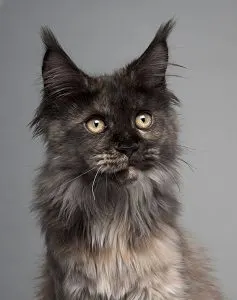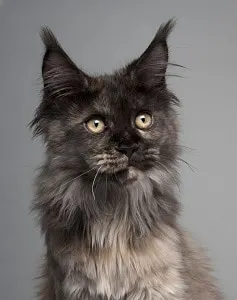 When we think of cats with greasy fur, we tend to imagine strays with matted fur and fleas. However, some cat breeds have more naturally occurring oils than others. This makes greasy fur a scale of sorts. Each breed has their threshold for what is greasy and what is not.
When we think of cats with greasy fur, we tend to imagine strays with matted fur and fleas. However, some cat breeds have more naturally occurring oils than others. This makes greasy fur a scale of sorts. Each breed has their threshold for what is greasy and what is not.
So, do Maine Coons have oily fur? Yes, Maine Coons are recognized for their oily fur. It is a glossy coat that is water-resistant. However, this only should be seen as glossy, not oily. Even though Maine Coon coats are more “oily” than other breeds of cat, it should not be obvious, dirty, or cause matting.
Cats should not have noticeable greasy fur, and this can be warranted for concern. Greasy can stem from various health concerns and cause additional health problems. Before we dive into all of that, lets first explore the reasons Maine Coon cats have glossy fur.
Why Maine Coons Have Glossy Fur
It is hypothesized that Maine Coons are native to North America, specifically from Maine. No surprise there, given the name! The closest relative to Maine Coons are the Norwegian Forest Cat. Although there are definitive links, the climates are similar. This points to similar adaptation.
The climate of Maine can be rugged. These cats needed to survive harsh winters, winds, and water. They were able to develop a way to do so with their fur.
They adapted by growing long, shaggy fur that is water-resistant. The water resistance is what causes Maine Coons to have a more glossy coat. This was important because it protected the cats.
Maine Coons should have a glossy coat, not greasy. If your cat has a greasy coat, it might be time to investigate different causes. Greasy fur can be a sign of health issues or nutrient complications.
Cats Need to Groom
Cats are natural groomers. We often walk into a room and see our kitties either sleeping, staring out a window, or grooming themselves. An article from PetMD suggests that a cat’s saliva may be antibacterial. That and the barbs on their tongue create an effective “comb” that helps get rid of mites, dirt, and tangles.
As we’ll discuss further, a cat may simply give up grooming. Underlying conditions usually cause this behavior. One vet expressed that several obese cats have shown greasy fur and dandruff on their backs because they can’t reach.
Grooming also helps:
● Circulation
● Body temperature
● Distributes oils to the rest of the fur
What Causes a Greasy Cat?
There are several different reasons a cat can have greasy fur. Most come down to health problems, improper diet, or behavioral issues. In some cases, it could simply be genetic. We will dive deeper into the different ways shortly. It is important to understand that your cat’s coat is a reflection of your cat’s health.
Greasy fur can cause matting. This is an increased risk for long-haired cats. Matting can cause pain and discomfort for your cat and also hides bugs or various parasites.
Health Problems
Cats are not going to show that they are in pain or sick. It is up to the owners to become detectives and spot different signs of sickness. The most apparent sign of illness is paying attention to their coat.
If your Maine Coon went from glossy to greasy, it is time to take a closer look. When a cat has greasy fur, it is because of a condition called seborrhea oleoa. This is when a cat overproduces oils. Somewhat like a teenager with oily skin. Other types of seborrhea usually cause dryness and flakiness like a person with dry skin. A cat can have both.
Seborrhea is usually a sign of a deeper problem, either externally or internally. If external possibilities (like mites) are eliminated, then talk to your vet about checking other health concerns. Some health problems can include:
● Vitamin deficiency (easily fixed)
● Skin irritation from allergens (easily fixed)
● Parasite infestation (moderate)
● Hormone imbalances (such as hypo-/hyperthyroid) (contact a vet)
● Auto-immune disease (contact a vet)
● Arthritis (contact a vet)
● Metabolic disorders (contact a vet)
● Diarrhea (contact a vet)
It is essential to take your cat to the vet if you believe any of these conditions are possible. When treated, there will more than likely be a noticeable improvement to your cat’s coat.
Improper diet
An improper or imbalanced diet can cause vitamin deficiencies. Cats need different amounts of nutrients in certain stages of life or based on their activity. To maintain a healthy coat a cat needs to eat quality proteins, fats, and carbohydrates.
These should be high-quality foods. If not, it is possible that your cat may not be receiving the nutrients from the food. This is one way a deficiency is caused. Another possibility is that they are not eating the right food for their life stage. Kittens need a different ratio of nutrients than adult cats do.
The type of food you provide your cat is also important. Wet food might have more protein and fat, but dry food has more carbs. It is suggested to provide a healthy mix of both. This ensures the right balance of carbohydrates, fats, and proteins.
Behavior and Age
Some cats simply stop grooming themselves. All cats respond to stress differently, but several cats have been known to stop grooming and start excessive shedding. Big events, such as a move or new baby, are huge stressors to cats. Introduce the cat slowly to new stimuli.
Age is another reason why a cat may have a greasy coat. Joint pain and tiredness may cause the cat to ignore their grooming habits. At one point in time, I have had to groom older cats, including cutting away matted fur and brushing each day. The cat’s fur was greasy, and if it got too bad, I had to spend time degreasing her.
Obesity
Feline obesity is another reason why a cat would stop grooming, causing oily fur. If a cat is too obese, they are unable to reach certain parts of their body.
If your cat is suffering from feline obesity, consult your vet about a health care plan.
What To Do If Your Cat Has Greasy Fur
The first step is to consult your vet. More than likely, the underlying cause will be identified and treated. Cats constantly shed to replace their fur. So, if the root cause is taken care of, the cat will shed the dirty coat and replace it with healthy fur. Cats with arthritis or obesity problems will begin to groom themselves once again.
Cats are already afraid of water, but Maine Coons are known to enjoy it. Even so, bathing a cat should be an absolute last resort. This can cause a lot of stress on the cat. If you and your vet decide that it is best to bathe your cat, there are two ways to handle it.
The first option is to take them to a professional groomer. They are experienced and will know the right shampoos and degreasers to use. The second option to wash your cat yourself. This is not recommended because it can be unsafe for you and your cat. However, be sure to pick a shampoo for the specific purpose of degreasing. Be sure to read instructions on the best way to bathe your cat.
Generally, Maine Coons are known to have more glossy coats. However, this does not mean that they should be greasy or matted. If this is the case, the first step is to rule out health problems. Talk with your vet about possible health issues your cat might have. Next is to treat and care for your kitty. If bathing has to happen, do it responsibly and pick the best tools for the job. Your cat’s coat is a reflection of its health, so always be on the lookout for clues that might point to health concerns.

My name is James, and welcome to FAQCats!
Along with our team of cat owners, expert pet enthusiasts, and pet professionals, we aim to write engaging helpful, engaging content about cats. At FAQCats we strive to provide content that’s accurate and fun to read. Our team writes about everything related to cats; even the most complex of topics. Through extensive research and caring for our own fur-pals, we’re able to provide something cat owners worldwide will love. Have a look around, and leave us feedback anytime!

